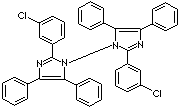PRODUCT IDENTIFICATION

CLASSIFICATION
PHYSICAL AND CHEMICAL PROPERTIES
white crystalline powder
REFRACTIVE INDEX
APPLICATIONS
APPEARANCE
white crystalline powder
99.0% min
|
|
|
| 2,2'-BIS(2-CHLOROPHENYL)-4,4',5,5'-TETRAPHENYL-1,1'-BI-1H-IMIDAZOLE | ||
|
PRODUCT IDENTIFICATION |
||
| CAS NO. | 1707-68-2 |
|
| EINECS NO. | 216-952-7 | |
| FORMULA | C42H28N4Cl2 | |
| MOL WT. | 659.60 | |
| H.S. CODE | ||
| TOXICITY | ||
| SYNONYMS | BTB; | |
| 2-(2-chlorophenyl)-1-[2-(2-chlorophenyl)-4,5-diphenyl-imidazol-1-yl]-4,5-diphenyl-imidazole; | ||
| SMILES |
|
|
|
CLASSIFICATION |
|
|
|
PHYSICAL AND CHEMICAL PROPERTIES |
||
| PHYSICAL STATE |
white crystalline powder | |
| MELTING POINT | 200 - 203 C | |
| BOILING POINT | ||
| SPECIFIC GRAVITY | ||
| SOLUBILITY IN WATER | ||
| AUTOIGNITION | ||
| pH | ||
| VAPOR DENSITY | ||
| NFPA RATINGS | ||
|
REFRACTIVE INDEX |
||
| FLASH POINT |
| |
| STABILITY | Stable under ordinary conditions | |
|
APPLICATIONS |
||
| Photoinitiators undergo a unimolecular bond cleavage upon irradiation to yield free radicals (benzoin esters; benzil ketals; alpha-dialkoxy acetophenones; alpha-hydroxy-alkylphenones; alpha-amino alkyl- phosphine; acylphosphine oxides). Another type of photoinitiators undergo a bimolecular reaction where the excited state of the photoinitiator interacts with a second molecule (a coinitiator) to generate free radicals(benzo phenones,amines; thioxanthones,amines; titanocenes). Photoinitiators are widely applied in UV curing inks, wood coatings, paper coatings, optical fiber, PCB, screen printing , paper varnish and other surface coatings. | ||
| SALES SPECIFICATION | ||
|
APPEARANCE |
white crystalline powder | |
| CONTENT |
99.0% min | |
| MELTING POINT | 200 - 203 C | |
| TRANSPORTATION | ||
| PACKING | 25kgs in bag | |
| HAZARD CLASS | ||
| UN NO. |
| |
| OTHER INFORMATION | ||
|
|
|